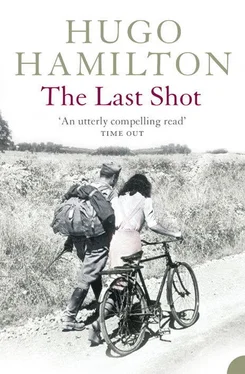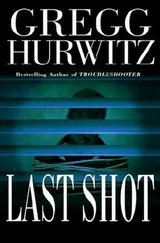1 ...8 9 10 12 13 14 ...39 She looked away at first and couldn’t believe it. Then she looked again before the train moved along behind a large timber-shed and straight into the woods again. There in the yard she had seen three men hanging from an improvised scaffold. She saw them long enough to believe it. Their bodies were limp. Their heads hung down as though they were asleep or something. They wore civilian clothes and had cardboard signs around their necks. Some soldiers stood around the yard, looking on. Smoking. Or maybe it was their breath. There was no breath from the men hanging.
It was the only time that Bertha’s eyes fully met those of the recruit in the carriage with her. He had obviously seen it too, and a stark acknowledgement flashed between them until they remembered their own situation and ignored the brief contact again.
Bertha could not help thinking about it as the train rocked along through the white landscape, through a German fairytale. Had they done that for Germany? For her? All the time, as the train sped on towards Prague, she kept repeating her own secret name for that day in her mind. The Timber-yard of silent breath. With a combination of fury and fear, she repeated the title in her head like a lullaby, trying to keep a nightmare away. Later, she changed it again. It became: the Timber-yard of breath.
The journey took sixteen hours. For a long time, she was unable to eat the sandwiches she had brought with her. She felt sick. She was also afraid to share her food with the nameless soldier in her compartment. Only when it was dark did she decide to eat furtively, avoiding any eye contact. She ate alone, chewing quietly. The food soon gave her a warm feeling. But it felt all wrong. In the dark, she leaned over and placed a sandwich made of black bread and cheese on the seat beside the soldier. The boy took the sandwich without a word. Their silent chewing was like a coded conversation.
The train arrived in Prague early in the morning on New Year’s Day. The boy was led away, handcuffed to another soldier.
At the time, Bertha’s own luck seemed more important to her. But in the subsequent months while she was stationed in Laun, it played on her mind. The men hanging. And the young soldier chained to the seat. She should have spoken to him. Asked his name. Encouraged him. Memorized his address so that she could send word to his mother for him. But there were always other things which took over. Other personal fears.
‘We were all fed on fear,’ she wrote in her diary.
I kept in touch with Anke and Jürgen. On the rare occasions that they came back to Düusseldorf on a weekend, they came to visit me. Once every two years only. We would spend the night out in a restaurant talking, drinking. We kept in touch by post mainly. Or by phone. Every year I sent a gift for Alexander on his birthday: 1 October. And Anke would write me a short, impulsive letter back just to let me know they were alive. If I didn’t get a letter I could expect a call sooner or later.
They were very happy in Münster. Jürgen was doing extremely well in his father’s practice. Though Anke sometimes complained that she didn’t see enough of him. And occasionally, she hinted that she would like to be back in her city for a while. But Jürgen would never move back to Düsseldorf. Anyway, it was out of the question because of the new practice.
Once, Anke sent a photograph of herself and Alexander to keep me up to date. She hadn’t changed a bit. Though I would not have said that in a letter. My letters were strictly neutral. They were addressed to both Jürgen and Anke, usually in that order. The kind of neutral letters which are read out over the breakfast table before they collect jam stains. This is one of her letters. It was sent when Alexander was three years old. Far from neutral, I thought.
Got your present for Alex, thank you very much. Though I don’t quite know what he is going to do with it. All toys eventually drive us mad because it only reminds us of his limitations. A toy is like a test to a child’s limits. The joy that most parents get is watching their children break down those limits. Jürgen and I, we have to make exceptions for everything. Of course I’m very grateful that you remember Alexander’s birthday like this every year. Sometimes I get the urge to talk to somebody else about our life, somebody outside the family, somebody not directly involved…
Anke had never said anything like this to me about Alexander’s difficulties before. She would never even refer to his having Down’s Syndrome. She had told me that Alexander was going to a special school, and occasionally described his retardation and lack of progress on the phone when I asked her, but she always painted a picture of extreme patience. I would never have thought she was anything less than completely happy. It came as a total surprise. The letter ended like this:
Sometimes I want to be back in Düsseldorf. Or in the Eifel. I think about you. I think about my other life.
Anke
On 6 May, the German Army was still in occupation at Laun. And they still occupied the protectorate of Czechoslovakia. By a thread.
Overnight, German planes had flown over the capital of Prague raining down leaflets appealing to the inhabitants to submit, or pay for it in blood. The leaflets promised that no Czech would be harmed and that the German Army wished only to engage the real enemy: the Red Army. Later on, the same planes flew over Prague again with a more persuasive message: phosphor bombs. SS units with tanks approached from the south to regain control of the city, following orders literally: ‘the whole nest has to burn’.
In Laun, the German Wehrmacht training garrison became actively involved in the war for the first time. Early that morning, local observers from the town posted to watch the garrison overnight came back to report to the committee at the U Somolu pub that large troop movements were seen leaving in the direction of Hriskov. At least six or seven trucks full of soldiers. There was nothing the committee could do but warn the people at Hriskov by phone. Nothing Laun could do but wait.
Bertha Sommer had not been up to see Hauptmann Selders give the order to send out troops. She arrived to find the office in a frenzy of activity. She was there in time to see the trucks leaving; in time to feel a futile compassion for all those young recruits heading in the direction of the fighting. South. East. Into the hands of the Red Army.
Bertha had given up her own final chance to escape the end. But instead of becoming dismal, she decided to become useful. She took up the task of keeping in touch with other garrisons around Bohemia, to see what their information was. Garrisons like Trutnov, which had also taken a stand against the Czechs with hostages.
It became clear by now that Officer Franz Kern had begun to play the most important role of all. As radio engineer, he was the lifeline to the outer world. Every twenty minutes, he appeared in the office with fresh news. Reports from Prague or from Moscow; sometimes even as far away as London.
Bertha had not spoken to him since their escape failed. She wanted to catch his eye, to get some acknowledgement. She wanted to let him know that she had tried to escape with him the night before. It was the rain. She wanted him to know that she had not informed on him. But Officer Kern seemed too preoccupied. Their eyes met only in passing. There was no communication between them. No signal.
When she eventually found an excuse to go out into the corridor, she was hoping to catch him and speak to him briefly. With the Third Reich collapsing around them, she invented a reason to meet him alone for a moment, but he would not let her speak. He placed his index finger over his lips. He didn’t want to hear.
Читать дальше
Конец ознакомительного отрывка
Купить книгу












